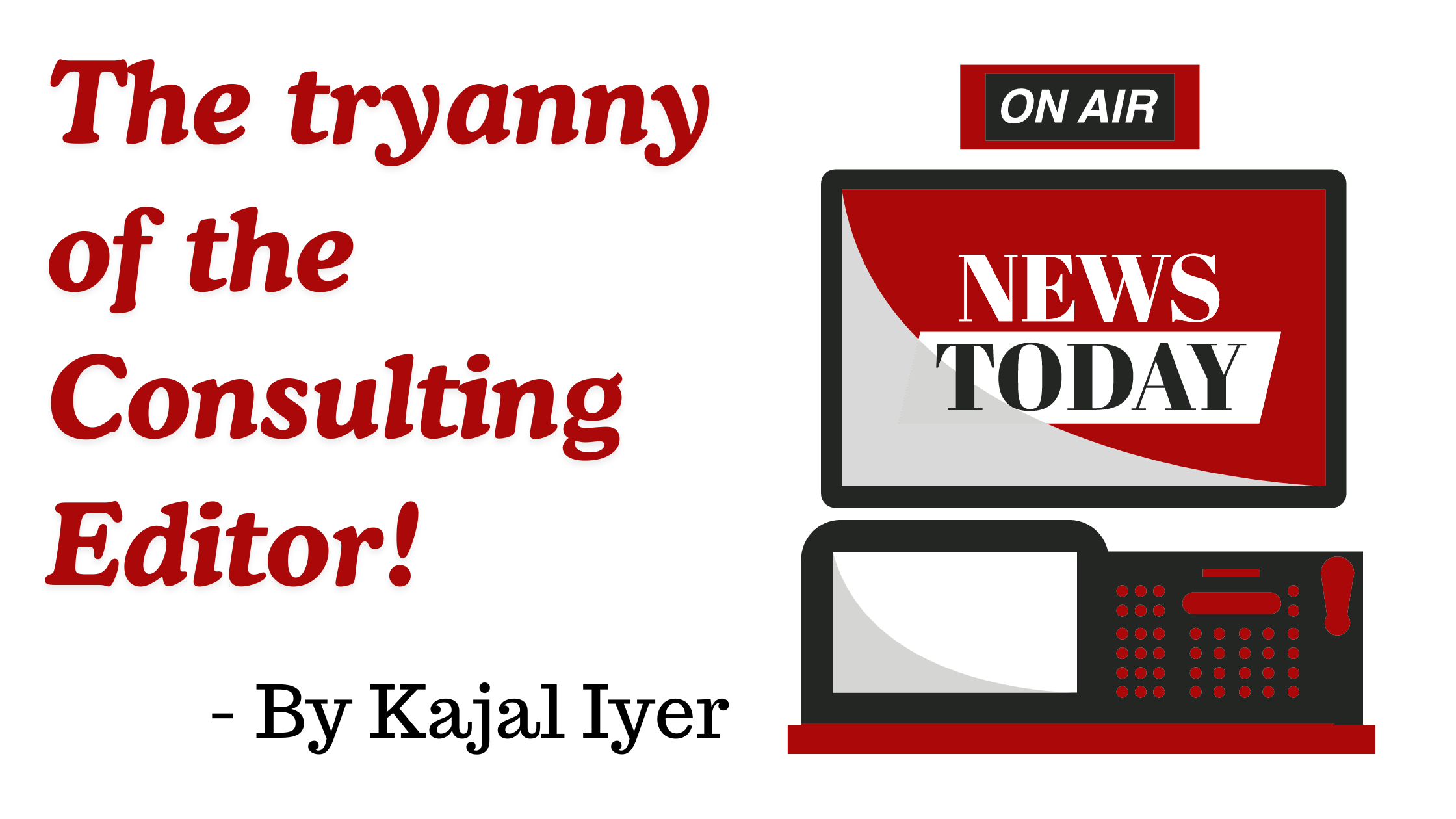
How people with limited journalistic understanding are ruling television newsrooms.
By Kajal Iyer*
In the past, which now seems rather distant, a ‘consulting editor’ in a newspaper or a television channel referred to someone who had years of experience or a specific expertise but he or she had a variety of pursuits and did not want to be bound by a company contract. The ‘consulting’ bit was key and not the editor. For the past decade or so, at least in television media, this definition no longer holds.
So, who are the ‘consulting’ editors you see these days on channels. Barring a few career journalists who either took a break and returned after a few years or were laid off and returned to channels, most of the ‘consulting editors’ especially the ones who also are anchors, are usually not from journalism backgrounds.
Now, journalism per se has never been a profession where only people with mass communication degrees worked. Sometimes experts in certain fields, who also write, end up as journalists, like say lawyers, political analysts and economists. Then there are also those who have no formal training but thanks to a wonderful nose for news, end up in newsrooms and are then groomed in journalistic etiquette. None of this is problematic per se, so long as the basic principles of fact-checking and balance in their writing voice is maintained.
In the past ‘consulting editors’ were not part of editorial meets nor did they know of the day to day functioning of the newsroom. They served the purpose of their own column or field and nothing else. Of late however, there is a new breed of non-journalistic people who have entered or rather infiltrated newsrooms and these are people who do not wish to maintain the principles of journalism but wish to steer the entire newsroom to a different direction.
It all started with the practice of having people who looked and sounded better in English being taken on as anchors irrespective of their reporting credentials. Some channel owners therefore started hiring anchors from non-reporting backgrounds such as general entertainment or sports. These individuals would work specific hours, only read out their bulletins and then leave, without much interaction or input into the news flow or stance of the newsroom. As some of these individuals became more and more popular or in case, they came with the Indian euphemism for nepotism, that is ‘recommendation’, they started to assert more power in the newsroom and dictate how their bulletins would go. Once that was allowed, they pushed further, buoyed by marketing departments that sold ads claiming it would go in such and such anchor’s bulletins. Slowly, the hold of such anchors increased in newsrooms and they began to lord over reporters who had their noses to the ground.
Plants with power
The second category of consulting editors, which is the most prevalent form today, are minor party workers or those ideologically affiliated with one political party or the other. These are people who are what journalists like to call ‘plants’ of the ruling dispensation. These consulting editors are given jobs on the basis of a recommendation from some politician. Sometimes, channel owners themselves seek out such persons to keep the ruling party happy. Often these consulting editors are the kind of people who aspire to become the spokespersons or leaders of the concerned political party. Most of them also have days jobs with the parties concerned either as digital marketers or even as psephologists.
It is not as if these kind of ‘plants’ are a new phenomenon. They have existed in the media for long. What has changed now, is the kind of power and control they wield in news channels and the undue influence they exert on what makes it to prime time. While earlier such consulting editors were never made part of the newsroom discussions, now they are part of edit meets, editors’ WhatsApp groups and have almost a free hand in dictating the tone of the reportage. If a reporter resists, it is likely the reporter would face disciplinary action, as the editor and the owners would listen to what the consulting editor says. Many a fine reporter with years of experience has had to face being dubbed as an opposition stooge for not catering to the consulting editor’s demands. These demands are never made to the reporter directly but are conveyed as non-negotiables by their reporting managers and editors. The stories in the recent past where such consulting editors had a disproportionate say in the way events were reported are the farmers protests, the Delhi riots, Covid-19 coverage, the Sushant Singh Rajput case and the recent elections. In fact, it wouldn’t be wrong to say that the echo chamber created by such consulting editors was also one of the reasons why many news channels got these election predictions so wrong.
Influencers and others
Another category of consulting editors is that of influencers. Now technically, this isn’t a very bad choice because if your news is accurate and public centric, it wouldn’t hurt having someone with better reach to get the word out. However, a lot of these influencers come with the baggage of their own personality and often shows have to be tweaked to fit their image. Considering choosing influencers as consultants is more a marketing call than an editorial one, it also leads to increased interference of marketing departments in editorial decisions.
There is also another kind, the retired journalists as consulting editors. While they may have a lot of journalistic experience, often they are not in touch with what is happening at that particular time on ground. This often leads to opinion getting more weightage than facts.
The proliferation of these consulting editors has undermined journalism in the following ways: First, the reduced say of reporters within newsrooms; second, prioritisation of opinions and ideological leanings over facts; third, non-journalistic staff taking important journalistic calls; fourth, an increased interference of marketing departments and lastly, easier newsroom access to political parties, leading to compromised newsrooms.
The reader may not be remiss to wonder, why journalism organisations may continue to entertain the kind of practices that may eventually end journalism as we know. There are a few reasons for this: the compulsion to keep the ruling dispensation in good humour; the pressure from marketing departments on editorial decision making; the revenue resulting from the above two points.
It would, therefore, be safe to say that even though consulting editors may change journalism as we know it and are probably a major cause of newsrooms losing credibility, so long as the moolah comes in, their tyranny shall continue.
*Kajal Iyer worked in television news media for almost 15 years. She is a qualified lawyer and communications professional


